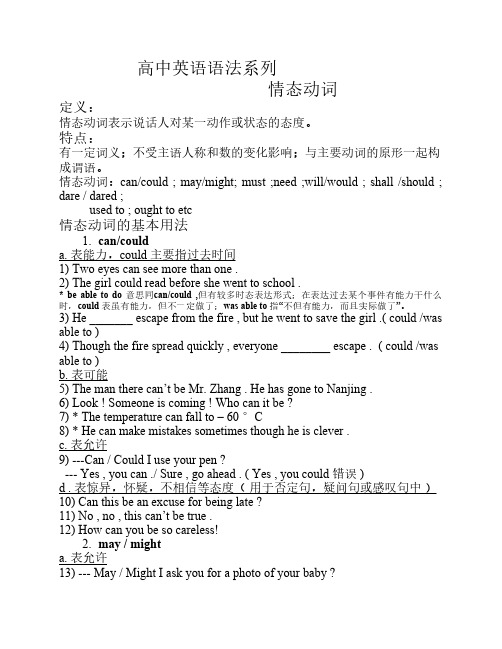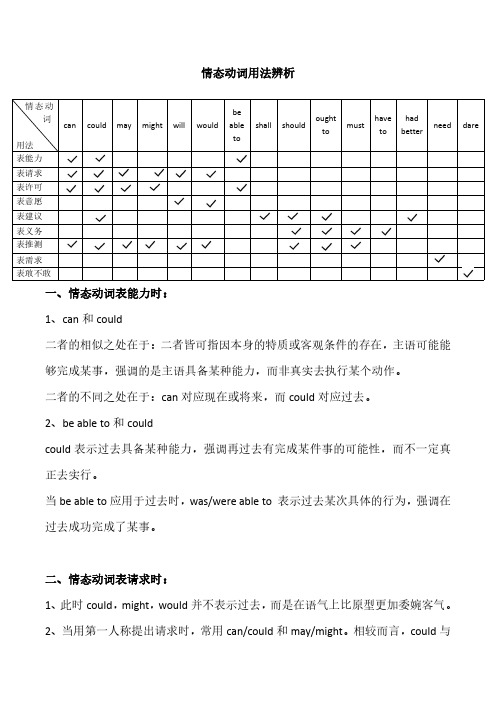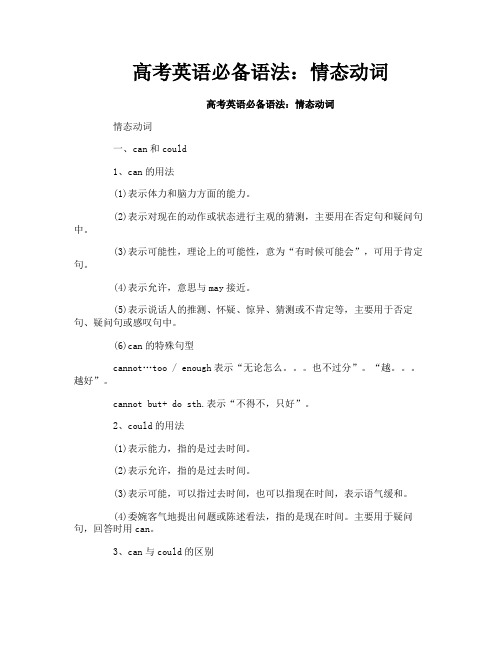高二英语情态动词语法
高中英语语法系列情态动词

高中英语语法系列情态动词定义:情态动词表示说话人对某一动作或状态的态度。
特点:有一定词义;不受主语人称和数的变化影响;与主要动词的原形一起构成谓语。
情态动词:can/could ; may/might; must ;need ;will/would ; shall /should ; dare / dared ;used to ; ought to etc情态动词的基本用法1. can/coulda. 表能力,could 主要指过去时间1) Two eyes can see more than one .2) The girl could read before she went to school .* be able to do 意思同can/could ,但有较多时态表达形式;在表达过去某个事件有能力干什么时,could 表虽有能力,但不一定做了;was able to 指“不但有能力,而且实际做了”。
3) He _______ escape from the fire , but he went to save the girl .( could /was able to )4) Though the fire spread quickly , everyone ________ escape . ( could /was able to )b. 表可能5) The man there can’t be Mr. Zhang . He has gone to Nanjing .6) Look ! Someone is coming ! Who can it be ?7) * The temperature can fall to – 60 °C8) * He can make mistakes sometimes though he is clever .c. 表允许9) ---Can / Could I use your pen ?--- Yes , you can ./ Sure , go ahead . ( Yes , you could 错误 )d . 表惊异,怀疑,不相信等态度(用于否定句,疑问句或感叹句中)10) Can this be an excuse for being late ?11) No , no , this can’t be true .12) How can you be so careless!2. may / mighta. 表允许13) --- May / Might I ask you for a photo of your baby ?--- Yes , please . / Certainly ./ Please don’t ./ You’d better not ./ No , you mustn’t.b. 表可能,might 语气更加不肯定14) She may be at home .15) She might come to the party , but I am not sure .c .祝愿16) May you succeed !3 . musta . 表义务,意为“必须”,主观意志;而have to 为“不得不”,客观要求。
高中英语情态动词的用法

高中英语情态动词的用法高中英语情态动词的用法一概述情态动词的共性1)情态动词一般直接加动词原形, 除ought + to do sth .在否定句或疑问句中to 可以省略2)情态动词不会因为主语的人称与数的变化而发生变化3)当情态动词表达与说话同时或说话之后的情况,直接加动词原形(do sth/be done) .在简略回答时直接用情态动词(---Can you drive a car? ---- Yes, I can)(1)She said he might come to the farewell party (表达说话之后的情况)(2)She told me that he must be ill, for his face was pale(表达与说话同时情况)4)当情态动词表达说话时已发生的情况,加动词完成式( have pp/have been pp)在简略回答时用情态动词+ have (---- Did he go to the cinema? ---- No, he should have,but he had to finish a report)(1)She may have been there yesterday(2)She should have come to his rescue when he was trapped in the elevator last night(3)He must have been praised at the meeting the other day二情态动词用法1 can1)表示现在或将来的能力,2)表示可能性“可能”(1)在肯定句中指逻辑推理的可能性,不指具体的事情的可能性,即泛指的可能性但在否定句或疑问句中可以表达具体一件事情的可能性 A: Driving carelessly can be dangerous B: Too much stress can drive a person mad C: Everybody can make mistakes in his life D:There being too much snow on a highway can lead to accidents (2)在否定句中表示“不可能”A: He can?t be hungry B: She can?t have been criticized at last week?s meeting C: She can?t possibly be tired(3)在疑问句中表示“可能吗?”A: Can she have been to the scenic spot last Friday?(4)S + can have (been)+ pp表示“可能已发生某事”,一般用在否定句或疑问句,如: Can she have been to the scenic spot last Friday? (5)在肯定句中还可以表示“有时可能” A: Scotland can be very cold in winter B: He is a bad-tempered guy, but he can be quite charming when he wishes C: You can be very annoying总之can表示可能性“可能”时可以用在肯定句、否定句和疑问句中。
情态动词用法归纳总结

情态动词用法辨析情态动词用法can could may might will would be able to shall should ought to must have to had better need dare表能力表请求表许可表意愿表建议表义务表推测表需求表敢不敢一、情态动词表能力时:1、can 和could二者的相似之处在于:二者皆可指因本身的特质或客观条件的存在,主语可能能够完成某事,强调的是主语具备某种能力,而非真实去执行某个动作。
二者的不同之处在于:can 对应现在或将来,而could 对应过去。
2、be able to 和couldcould 表示过去具备某种能力,强调再过去有完成某件事的可能性,而不一定真正去实行。
当be able to 应用于过去时,was/were able to 表示过去某次具体的行为,强调在过去成功完成了某事。
二、情态动词表请求时:1、此时could ,might ,would 并不表示过去,而是在语气上比原型更加委婉客气。
2、当用第一人称提出请求时,常用can/could 和may/might 。
相较而言,could 与may在表请求的问句中出现的频率最高;might表发请求的语气最为委婉客气,因此反而很少见;而can则常用于熟人间的对话中。
语气强度:can>could/might>might3、当用第二人称提出请求时,常用can/could和will/would。
其中could和would 表达请求的语气更委婉客气;而can与will则常用于熟人对话中。
语气强度:can/will>could/would三、情态动词表许可时:1、与表请求不同,will/would不论前接第几人称,都表示主语本身的意愿,无需得到他人的“许可”,所以will/would不可以用于表请求的句中。
2、can和may二者都可以表示对现在或将来动作的许可,其中can的使用频率更高。
高中英语语法讲解: 情态动词

高中英语语法讲解:情态动词概述1.共有10个情态动词:can/could, may/might, will/would, shall, should, ought to, must;2个半情态动词need, dare2.特点:(1)情态动词后加动词原形(即不带to的不定式)一起构成谓语;(2)没有人称和数的变化;(3)多数情态动词有过去式,但其过去式有时并不表示时态,而只起“委婉或不确定语气”的作用。
Would you do me a favour? She may/might be watering the flowers now.3.情态动词在句子中可发挥不同作用,如表能力,表责任与义务,表推测,表征求允许,表请求,表建议,表语气态度等等He can/could run 100 meters in 11 seconds.You should/ought to/must work hard to win a gold medal.Can/Could/May/Might I watch the Olympics tonight?Will/Can/Could/Would you help me with my training?He might/may/could/should/ought to/will/must watch the football match tonight.I suggest that you should watch the opening ceremony.Can this be true?4.情态动词+do 表对一般现在或将来情况的推测情态动词+ be doing 表对正在发生的事情的推测情态动词+have done 表对过去已经发生的事情的推测一、can/could 的用法1.表能力(1) can do现在一般的能力(2) could do过去一般的能力(3) could have done过去有能力做但没做具体某事(4)was/were able to do = managed to do/ succeeded in doing 过去有能力做且做了具体某事。
高考英语必备语法:情态动词

高考英语必备语法:情态动词高考英语必备语法:情态动词情态动词一、can和could1、can的用法(1)表示体力和脑力方面的能力。
(2)表示对现在的动作或状态进行主观的猜测,主要用在否定句和疑问句中。
(3)表示可能性,理论上的可能性,意为“有时候可能会”,可用于肯定句。
(4)表示允许,意思与may接近。
(5)表示说话人的推测、怀疑、惊异、猜测或不肯定等,主要用于否定句、疑问句或感叹句中。
(6)can的特殊句型cannot…too / enou gh表示“无论怎么。
也不过分”。
“越。
越好”。
cannot but+ do sth.表示“不得不,只好”。
2、could的用法(1)表示能力,指的是过去时间。
(2)表示允许,指的是过去时间。
(3)表示可能,可以指过去时间,也可以指现在时间,表示语气缓和。
(4)委婉客气地提出问题或陈述看法,指的是现在时间。
主要用于疑问句,回答时用can。
3、can与could的区别can表推测时只用于否定句和疑问句(could无此限制)。
couldn’t的可能性比can’t小。
4、can与be able to的区别(1)现在时:无区别,但后者不常用。
(2)完成时;can没有完成时,此时要用have(has,had)been able to。
(3)将来时:can没有将来时,要用will be able to。
(4)过去时:could表示一般能力,was/were able to 表示在具体场合通过努力成功做成某事的能力。
二、may 和might1、may的用法(1)表示询问或说明一件事可不可以做。
(2)表示一件事或许会发生或某种情况可能会存在,通常用在肯定句和否定句中。
注意:表示可能性时,can’t语气强,表示“不可能”,may not语气弱,表示“可能不”。
2、might的用法(1)表示询问或允许,指的是过去时间。
(2)表示可能发生的事,可以指过去时间,也可以指现在时间,语气更加不肯定,可能性比may小一些。
外研版高二英语选修6 Module 1 语法指导:情态动词 及练习含答案

情态动词一、一些情态动词的常见用法1. can和may都可表示允许。
如:Can / May I take the book out?2. would和used to都可表示“(过去)常常”,但“would +动词原形”单纯表示过去经常做某事,而“used to +动词原形”表示过去常常做某事而现在不做了。
如:Bob would always turn and wave at the end of the street.I used to smoke, but I gave up a couple of years ago.3. may, might, could, must都可表示肯定推测,其中,might语气最弱,must语气最强。
must表推测时,否定句和疑问句中用can。
如:It may or may not rain.I'm not sure I'll go to Jeff 's Party. I might go to the concert instead.It could cost your life if you are not careful.You must be Mr. Smith. I was told to pick you up.The girl riding the bike can't be Mary. She's in New York.There's someone outside. Who can it be?二、一些情态动词的特殊用法1. should表示惊异,意为“竟然”。
如:It wasn't right that such near neighbours should not know one another.2. must表示“偏要,硬要”。
如:Must you worry her with questions, just when she's busy cooking?3. shall用于陈述句中,表示许诺、威胁、决心、规定等。
2022高考英语语法金点拨-情态动词

2022高考英语语法金点拨-情态动词一.情态动词的语法特点1)情态动词除ought 和have 外,后面只能接不带to 的不定式。
2)情态动词没有人称,数的变化,即情态动词第三人称单数不加-s。
二.情态动词的用法(Can/could、May/ might、Must、Shall/should、will/would、Dare、Need、ought to)(一). Can1.差不多用法1)表示能力The parrot can speak three languages.2)表示要求/承诺Can/Could I borrow the book from the library.Yes.I can/No.I can’t。
(Could 不表过去式;只表语气更委婉,表要求只用于疑问句)3)表示可能性Shanghai can be very cold in March.2. Can 与be able to1)can could 表示能力;可能(过去时用could)2)表示过去成功地做了某事时,只能用was/were able to,不能用could。
He was able to flee Europe before the war broke out.= He managed to flee Europe before the war broke out.3)在否定结构中,二者能够互换。
3. can/could + have +p.p1)在否定、疑问句中表示“对过去发生行为的可能性推测。
The door was lacked. She couldn’t have been at home.2)在确信句中表示“本来能够做而未做” You could have been more careful.4.习语:cannot / can’t(never/hardly)do…too …“越……越好,如何也只是分”。
You cannot be too careful when you drive a car.驾车时候,越小心越好。
高中英语语法——情态动词总结(附带练习)

情态动词总结I 情态动词的特征:1.本身有词义。
2.不能独立作谓语。
2. 后接动词原形一起构成谓语。
3. 不随人称和数的变化。
II 情态动词各自的基本意义及用法:1.大多数情态动词(除表‘能力、许可、意志’外),都可以表示推测,其程度有差异。
按可能性程度的高低排列为:must﹥will ﹥would ﹥ought to ﹥should完全肯定完全可能很可能﹥can ﹥could﹥may ﹥might可能有可能2. 区分情态动词的否定含义:may not或许不、可能不might not可能不can’t 不可能mustn’t不许、禁止shouldn’t不应该needn’t 不必1.情态动词表推测的反意疑问句,简单来说,就是以情态动词后的时态为淮,如句子里有明确的时间状语,则以其为准。
2.以must 为例:E.g. 1. You must be hungry now, aren’t you?2. He must be watching TV , isn’t he ?3 Tom must have lived her for a long time, hasn’t he ?4. She must have arrived yesterday, didn’t she?注:如选择题中(以She must have arrived yesterday, didn’t she?为例)既有didn’t she又有hasn’t she则以didn’t she?为最佳答案。
IV 情态动词专项练习与解析一( ) 1. You _____ return the book now. You can keep it till next week if you like.A. can’tB. mustn’tC. needn’tD. may not( ) 2. Where is my pen? I _____ it.A. might loseB. would have lostC. should have lostD. must have lost( ) 3. I wish I _____ you yesterday.A. seenB. did seeC. had seenD. were to see( ) 4. I didn’t hear the phone. I _____ asleep.A. must beB. must have beenC. should beD. should have been( ) 5. If my lawyer _____ here last Saturday, he _____ me from going.A. had been; would have preventedB. had been; would preventC. were; would preventD. were; would have prevented( ) 6. He _____ you more help, even though he was very busy.A. might have givenB. might haveC. may have givenD. may give( ) 7. If it _____ for the snow, we _____ the mountain yesterday.A. were not; could have climbedB. were not; could climbC. had not been; could have climbedD. had not been; could climb( ) 8. Without electricity human life _____ quite difficult today.A. isB. will beC. would have beenD. would be( ) 9. A computer _____ think for itself, it must be told what to do.A. can’tB. couldn’tC. may notD. might not( ) 10. Jenny _____ have kept her word. I wonder why she changed her mind.A. mustB. shouldC. needD. would( )11. We _____ last night, but we went to the concert instead.A. must have studiedB. might studyC. should have studiedD. would study( ) 12. — Could I borrow your dictionary?— Yes, of course you _____.A. mightB. willC. canD. should( ) 13. Tom ought not to _____ me your secret, but he meant no harm.A. have toldB. tellC. be tellingD. having told ( ) 14. — If he _____, he _____ that food.— Luckily he was sent to the hospital immediately.A. was warned; would not takeB. had been warned; would not have takenC. would be warned; had not takenD. would have been warned; had not taken ( ) 15. Peter _____ come with us tonig ht, but he isn’t very sure yet.A. mustB. mayC. canD. will( ) 16. I told Sally how to get here, but perhaps I _____ for her.A. had to write it outB. must have written it outC. should have written it outD. ought to write it out( ) 17. I didn’t see your sister at the meeting. If she _____, she would have met my brother.A. has comeB. did comeC. cameD. had come ( ) 18. — Shall I tell John about it?—No, you _____. I’ve told him already.A. needn’tB. wouldn’tC. mustn’tD. shouldn’t ( ) 19. When a pencil is partly in a glass of water, it looks as if it _____.A. breaksB. has brokenC. were brokenD. had been broken( ) 20. It’s nearly seven o’clock. Jack _____ be here at any moment.A. mustB. needC. shouldD. can( ) 21.— There were already five people in the car but they managed to take me as well.— It _____ a comfortable journey.A. can’t beB. shouldn’t beC. mustn’t have beenD. couldn’t have been ( ) 22. Johnny, you _____ play with the knife, you _____ hurt yourself.A. won’t; can’tB. mustn’t; mayC. shouldn’t; mustD. can’t; shouldn’t ( ) 23. The fire spread through the hotel very quickly but everyone _____ get out.A. had toB. wouldC. couldD. was able to ( ) 24. — When can I come for the photos? I need them tomorrow afternoon.— They _____ be ready by 12:00.A. canB. shouldC. mightD. need( ) 25. — I stayed at a hotel while in New York.— Oh, did you? You _____ with Barbara.A. could have stayedB. could stayC. would stayD. must have stayed ( ) 26. — Will you stay for lunch?— Sorry, _____. My brother is coming to see me.A. I mustn’tB. I can’tC. I needn’tD. I won’t( ) 27. — Are you coming to Jeff’s party?—I’m not sure. I _____ go to the concert instead.A. mustB. wouldC. shouldD. might( ) 28. — Write to me when you get home.— _____.A. I mustB. I shouldC. I willD. I can( ) 29. I was really anxious about you, you _____ home without a word.A. mustn’t leaveB. shouldn’t have leftC. couldn’t have leftD. needn’t leave( ) 30. — Is John coming by train?— He should, but he _____ not. He likes driving his car.A. mustB. canC. needD. may专项练习(二)1. I didn’t see her in the meeting room this morning. She _____ at the meeting.A. mustn’t have spokenB. shouldn’t have spokenC. needn’t have spokenD. couldn’t have spoken2. One ought _____ for what one hasn’t done.A. not to be punishedB. to not be punishedC. to not punishedD. not be punished3. If you really want yourself to be in good health, you must ___ always ___ so much.A. not; be smokingB. not; have smokedC. not; to smokeD. be not; smoking4. With so much work on hand, you _____ to see the game last night.A. mustn’t goB. shouldn’t goC. couldn’t have goneD. shouldn’t have gone5. Most of the students felt rather disappointed at the English party. They say that it ______ better organized.A. had beenB. had to beC. must have beenD. could have been6. I’m surprised that he _____ in the exam.A. should failB. would have failedC. may have failedD. should have failed7. The little girl _____ there alone.A. not dare goB. dares not goC. dare not goD. dare not to go8. “Must we do it now?” “No, you _____.”A. won’tB. needn’tC. can’tD. don’t9. He said he would rather not _____ it right now.A. doingB. to doC. doD. to be doing10. You _____ to the meeting this afternoon if you have something important to do.A. needn’t to comeB. don’t need comeC. don’t need comingD. needn’t come11. Put on more clothes. You _____ be feeling cold with only a shirt on.A. canB. couldC. wouldD. must12. I _____ play football than baseball.A. would ratherB. had betterC. like betterD. prefer13. I thought you _____ like something to read, so I have brought you some books.A. mayB. mightC. couldD. must14. There was plenty of times. She _____.A. mustn’t have hurriedB. couldn’t have hurriedC. must not hurryD. needn’t have hurried15. The plant is dead. I _____ it more water.A. will giveB. would have givenC. must giveD. should have given16. You _____ return the book now. You can keep it till next week if you like.A. can’tB. mustn’tC. needn’tD. may not17. It’s still early, you _____.A. mustn’t hurryB. wouldn’t hurryC. may not hurryD. don’t have to hurry18. Please open the window, _____?A. can’t youB. aren’t youC. do youD. will you19. We _____ for her because she never came.A. mustn’t have waitedB. shouldn’t have waitedC. mustn’t waitD. needn’t wait20. — May I stop here? — No, you _____.A. mustn’tB. might notC. needn’tD. won’t21. It’s a fine day. Let’s go fishing, _____.A. won’t weB. will weC. don’t weD. shall we22. I didn’t see her in the meeting room this morning. She _____ at the meeting.A. mustn’t have spokenB. shouldn’t have spokenC. needn’t have spokenD. couldn’t have spoken23. — Please don’t make a noise. — _____. I’ll be as quiet as a mouse.A. Yes, I won’tB. No, I won’tC. No, I willD. Yes, I will24. The young man has made so much noise that he _____ not have been allowed to attend the concert.A. couldB. mustC. wouldD. should25. — Where is John? — He _____ in the library.A. should beB. must beC. can beD. must have been26. Since the road is wet this morning, _____ last night.A. it must rainB. it must be rainingC. it must have rainedD. it must have been rain27. — Will your brother stay home tonight?— I’m not quite sure. He _____ to the cinema tonight.A. must goB. can goC. may goD. may be going28. She’s already two hours late. What ______ to her?A. can have happenedB. may have happenedC. should have happenedD. must happen29. You must be a writer, _____?A. mustn’t youB. are youC. must youD. aren’t you30. I got up early that morning, but I _____ so because I had no work to do.A. mustn’t have doneB. didn’t need to doC. needn’t have doneD. can’t have done31. He _____ have come here yesterday, but he didn’t.A. couldB. shouldC. ought toD. all the above32. I missed the last bus, so I _____ go home on foot.A. mustB. have toC. mayD. had to33. He ought to win the first prize, _____ he?A. oughtn’tB. shouldn’tC. mustn’tD. both A and B34. Everyone _____ do his best for the modernizations of our country.A. canB. mayC. shouldD. might35. Let’s clean our classroom, _____?A. will youB. don’t weC. shall weD. do you36. Let us play basketball, ______?A. will youB. don’t weC. shall weD. do you37. He asked me for this book many times. Please tell him that he _____ have it tomorrow.A. mustB. mayC. shallD. both B and C38. “Your phone number again? I _____ quite catch it.” “It’s 9568442.”A. didn’tB. couldn’tC. don’tD. can’t39. Mother _____ us stories when we were children.A. was used to tellB. is used to tellingC. used to tellD. used to telling40. She would rather _____ more money on books _____ on clothes.A. cos t … notB. to spare … don’tC. pay … thanD. spend … than专项练习(三)1. — Has Li Lin started? He said he would join in the party.— He ______. He is a man of keeping his word.A. could have leftB. must have leftC. can’t comeD. won’t be c oming2. — May I park my car here?— No, you ______. No car is allowed to park here.A. may notB. needn’tC. mustn’tD. daren’t3. — Excuse me, could you tell me where the Yajia Supermarket is?—It’s two blocks straight ahead. You ______ miss it.A. mustn’tB. can’tC. needn’tD. shouldn’t4. — I saw Mr. Sun at Tongyu Station this morning.—You ______. He’s still on holiday in Hawaii.A. couldn’t haveB. mustn’t haveC. shouldn’tD. needn’t5. — How about paying a visit to Dr. Wang, our former Chinese teacher?— Good idea. I will e-mail him today so that he ______ know ______ to expect us.A. shall; whyB. could; whenC. would; whatD. will; how6. Everything has two sides. Beautiful songs, sometimes, ______ be just noise to others.A. mustB. mayC. shouldD. could7. Someone ______ my umbrella. I found it wet yesterday.A. must be usingB. must have usedC. must useD. must have been using8. — How dangerous it was!— Yes, but for the passer-by’s quick action, th e girl ______.A. was drownedB. could have been drownedC. had drownedD. should be drowned9. You ______ scold such a pupil who always keeps silent so seriously that you ______ hurt him.A. should; canB. may; willC. mustn’t; mayD. can’t; must10. — Why does Alice know so much about Angkor Wat?— She ______ have been there, or ...A. mustB. oughtn’t toC. mayD. can’t11. —You may laugh, but I’ve been thinking of becoming a vegetarian.— Oh, you ______ be crazy. You will be hungry all the time.A. mustB. mayC. willD. need12. —What’s the matter with you?—Oh, I’m not feeling well in the stomach. I ______ so much fried fish just now.A. shouldn’t eatB. mustn’t have eatenC. shouldn’t have eatenD. mus tn’t eat13. — ______ he have been chosen as captain of the football team?— Yes, he ______.A. Can; must haveB. Must; must haveC. Can; mustD. Must; must14. Mr. Zhang ______ in Shanghai tomorrow morning.A. can have arrivedB. will have arrivedC. may have arrivedD. must have arrived15. Miss Wang started at 8 o’clock, and she ______ be there now.A. shouldB. canC. can’tD. need16. — It must be Mr. Li who did it. — No, it ______ be Mr. Li.A. mustn’tB. wouldn’tC. can’tD. may17. You ______ finish reading the book as soon as possible.A. mayB. canC. needD. should18. — Need you go to work now? — Yes, I ______.A. mustB. needC. canD. dare19. Your trousers are dirty. ______ them for you?A. Shall I washB. Will I washC. Am I going to washD. Am I washing情态动词专项练习与解析一【练习解析】1.C 从原题中You can keep it till next week if you like这一信息句可知,“你不必现在还”。
- 1、下载文档前请自行甄别文档内容的完整性,平台不提供额外的编辑、内容补充、找答案等附加服务。
- 2、"仅部分预览"的文档,不可在线预览部分如存在完整性等问题,可反馈申请退款(可完整预览的文档不适用该条件!)。
- 3、如文档侵犯您的权益,请联系客服反馈,我们会尽快为您处理(人工客服工作时间:9:00-18:30)。
。安全思想变,腰里的钱包也鼓了,就想着去城市安生,住着高楼大厦,交通便利,生活配套设施齐全。家乡,那片贫瘠却一成不变的山水成为即将被遗弃的地方。村落里剩下的 人越来越少,村庄里住户家数也越来越少,村庄的天空和大地似乎越来越空旷,一年又一年,一家又一家不是举迁到外地就是全部搬到县城。那片有着好山好水好风光的田原里住着走不出去的渐渐变老 的人们,越来越清静,越来越孤单,越来越珍惜大家在一方水土生活的时光。曾经人多时,家家户户不时有人因田间的水分争吵、大打出手,为了田间地头那几亩庄稼为了一日三餐的口粮以前的家乡人 折煞了腰,但是现在那些田地,任凭荒芜也没有人争抢。家乡还是用着世界上最落后的农耕方式。因为是丘陵地带,因为是亚热带地区,因为风调雨顺太难得,种田的人依然只能靠天吃饭。家乡的人们, 穷够了,苦够了,所以忍受能力强,在外面能吃苦能忍让能拼博。新生代的年轻人思想变化更快,世界有多大,要出去看过了才知道,心境有多宽,要多年历练后才知晓。不得不看到家乡人的思想在发 生着翻天覆地的变化,精神面貌随着物质的改变而顺应着改变。一直以来,红安靠着打工经济来维持并带动着有限的消费。因为生在老区山区落后的地方,红安的男孩女孩小时候的生活条件有限,为了 供养小孩的上学,上辈人要辛苦更多倍,红安的小辈们心中的压力和思想包袱更重。 有一天,当家乡已成故乡,成了一个曾经回去很少,或者叫老家的地方,我们在一边享受着现代物质生活的同时,也在怀念着曾经纯真并且远逝的时代。家乡已成故乡,因为那里只盛产一些记忆,却无 法安生。那里没有高房子,没有小车子,没有新时代的气息。有的是永远如当年般清澈的池水,如当年般青秀的山脉,如当年般干净的空气,如当年般明亮的星空。
